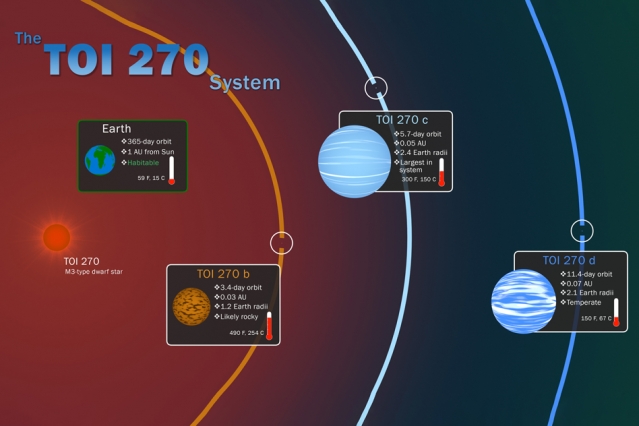NASA’s exoplanet hunter has spotted three new worlds in a nearby solar system

They were found using NASA’s Transiting Exoplanet Survey Satellite, which launched in April 2018 to hunt for habitable worlds in the nearby universe.
The discovery: MIT researchers have found three new planets 73 light-years away in a system called TOI 270 (for TESS Object of Interest), using data from the satellite. They were discovered thanks to the periodic dips in starlight caused by each orbiting world. The three planets are in the southern constellation Pictor and have very rapid orbits around TOI 270, a dwarf star.
They are some of the smallest and closest exoplanets ever discovered, but it’s unlikely any of them are habitable, despite their relatively warm temperatures: their atmospheres are probably too thick and dense. They include a small, rocky planet that is slightly larger than Earth and two gaseous planets about twice Earth’s size. Their discovery was described in a paper in Nature Astronomy.
Check those results: TESS has already found 21 new planets and another 850 potential worlds awaiting confirmation, all located within a few dozen light-years of our own solar system, MIT’s George Ricker told the New York Times. It has “far exceeded our most optimistic hopes,” he said.
The implications: These planets could help us understand the “missing link” between how small, rocky plants like Earth and huge, icy worlds like Neptune are formed, according to Maximilian Günther, a postdoc at MIT’s Kavli Institute for Astrophysics and Space Research, the lead author of the paper.
Want to stay up to date with space tech news? Sign up for our newsletter The Airlock.
Deep Dive
Space
How to safely watch and photograph the total solar eclipse
The solar eclipse this Monday, April 8, will be visible to millions. Here’s how to make the most of your experience.
How scientists are using quantum squeezing to push the limits of their sensors
Fuzziness may rule the quantum realm, but it can be manipulated to our advantage.
The great commercial takeover of low Earth orbit
Axiom Space and other companies are betting they can build private structures to replace the International Space Station.
Stay connected
Get the latest updates from
MIT Technology Review
Discover special offers, top stories, upcoming events, and more.